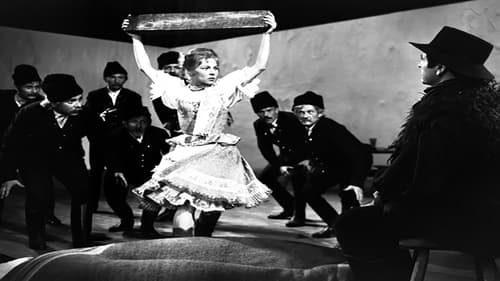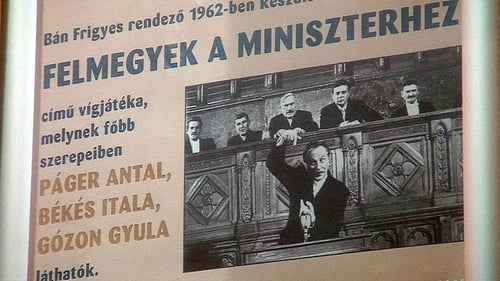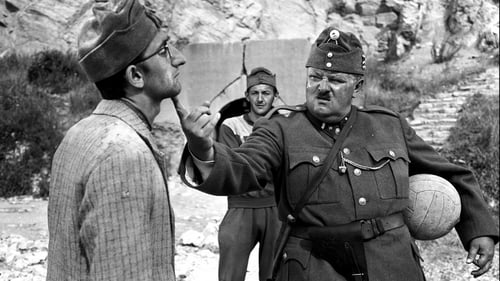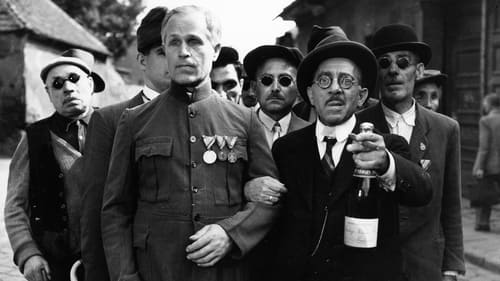Ferenc Szécsényi
Рождение : 1922-03-23, Sárszentmihály, Hungary
Смерть : 2014-05-15

Cinematography

Director of Photography
The scene is Ukraine. In 1943, after the Hungarian' defeat at the river Don, soldier Balogh decides to visit his family.

Cinematography
The musical adventure film goes back to the early eighteenth century, the times of the battles between the Hungarian insurrectionists and the pro-Austrians. Palkó and Jankó are about to join the insurrectionist army when they clash with a pro-Austrian troop. Jankó is captured and put in Count Koháry's prison.

Cinematography
Epic recalling the early days of the Republic of the councils.

Cinematography
During his neurological treatment, Gábor recalls his recent past. Happy moments of his marriage flash upon him, then he remembers the conflict that made his wife leave him and the women on whose side he is trying to forget.

Director of Photography
Andras Kovacs' film, considered one of the most important Hungarian films of the 1960s, centers around four men who await trial for their involvement in the massacre of several thousand Jewish and Serbian people of Novi Sad in 1942. Each denies any responsibility, claiming that they were only following orders. The film is significant for its willingness to address the subject of Hungary's role in WWII, which was taboo at the time of the its release.

Director of Photography
For the first time after 11 years, Simon, a young historian visits the village of his childhood at Balaton and Aunt Lina, his foster-mother. He gets upset by what he experiences there: the old woman's troublesome and vexing everydays, her quiet sadness. He is overwhelmed by his own memories, the death of his foster-father and by everything he was not aware of before, or he simply wanted to forget.

Cinematography
At the beginning of the thirties the sour, boring life of the Hungarian small town is enlivened by a charity action: with the lead of the beautiful wife of the attorney funds are raised for the orphans.

Music
The turnings of this satirical story are accentuated by the comments of the Director and the Author. Éva is in love with Zoli. She expects to live a wild and modern life by his side, not the boredom of a petite-bourgeois household. On a drunken morning, Zoli writes a poem. The poem is published in a morning paper and divides readers. Because of the poem the young man is dismissed it from his work, and his landlord kicks him out from the apartment.

Cinematography
Молодой учёный Янош, переживший все ужасы второй мировой войны, потерявший семью, женится вторично. Считая, что жить надо только сегодняшним днём, ибо человечество идёт к гибели, Янош убеждает жену сделать аборт. Но Тереза отказалась. После бурного объяснения с мужем у неё начались преждевременные роды. Мучительно переживая случившееся и опасаясь за жизнь жены, Янош спешит в больницу, чтобы сказать Терезе, что он был неправ и ребёнок должен жить.

Director of Photography
Az Életbe táncoltatott leány is a 1964 Hungarian film directed by Tamás Banovich. It was entered into the 1965 Cannes Film Festival where it won a Technical Prize

Director of Photography
Андриш хочет добиться доверия со стороны своих родителей, он нуждается в их поддержке, но отец занят проблемами, связанными с работой. Он должен принять решение по делу о коррупции, вскрытой на предприятии. Скрыть или придать огласке то, что случилось? Разговор между отцом и сыном заканчивается ссорой, но, в конце концов, отец всё же отдаёт предпочтение справедливому решению, он разоблачает злоупотребление служебным положением.

Director of Photography
Peti, the young parachutist starts concurring with his fellows during the training sessions: who dares to fall free longer? Orodán, his coach decides that if needed, he would use force to make him give up this perilous rowdiness.

Director of Photography
Sebők Zoltán, the brain surgeon, performed a secret abortion on his lover and the woman died. The man waiting for the autopsy (and his arrest) escapes to his father's villa at Lake Balaton.

Cinematography
A comedy about the organisation of agricultural co-operatives. In the village of "Rendes", everybody has already entered the co-op, only the stubborn farmer, Bódog Balogh continues to resist. The leadership plays all their tricks and uses all their efforts, but all in vain.

Director of Photography
Снятая по роману Лайоша Кашшака кинолента изображает изнурённых и обездоленных людей, работающих от зари до зари. Доведённые до отчаяния, они решаются на своеобразный бунт — отказываются платить домовладельцу за жильё.

Director of Photography
В одном из лагерей оккупированной немцами во время Второй мировой войны Венгрии намечается футбольный матч по случаю дня рождения Гитлера. На поле должны сойтись команда оккупантов и местный коллектив под руководством в прошлом звезды футбола, для которого этот вид спорта значит намного больше простой игры.

Director of Photography
This drama about a boorish non-conformist takes place in Hungary after the war and is dulled a little by political overtones but is still an engaging story. The setting is the countryside, where an independent, landowning farmer busies himself in his free time by bedding down the women on his farm and then tossing them aside. One such ill-treated lass ends up marrying a young man who is in charge of a communal farm, a farm the womanizing "beast" of the title is later forced to join. The arrogant, formerly independent farmer does not reform his ways and is soon chasing after the young manager's wife, the woman he dropped not that long ago. The results are disastrous.

Cinematography
Майор Золтан Бенедек — жестокий вояка, не знающий жалости. О его чувствах знает только Анна, вдова его младшего брата. В его полку ищут коммунистов и особо подозреваем полковник Доби, которого Бенедек видел с Анной. Подозрение падает и на Анну, но Бенедек бездействует. Его начальник тоже ничего не делает, потому что на тот момент он был влюблён в мать-одиночку Бенедека. Во время войны Бенедек дослужился до звания полковника. В хаосе конца войны он попадает среди дезертиров в советский трудовой лагерь, где судьба его сводит с Доби. Он хочет вернуться в свою часть, но охранники лагеря стреляют в него.

Director of Photography
В центре фильма судьба бедной девушки-служанки Анны, обманутой родственником хозяев. Доведенная до отчаяния, девушка убивает своих хозяев.

Director of Photography
По новелле Эндре Геллери Андора.
Действие фильма происходит в Будапеште в 1930 году. Кругом царит безработица. Вера и Иштван любят друг друга, но у них нет квартиры, нет денег. С большим трудом Вере удается найти работу. Боясь потерять ее, она становится любовницей хозяина магазина. Узнав об этом, Иштван отворачивается от нее.

Cinematography
По одноименному рассказу венгерского писателя Иштвана Фекете о маленькой собачонке Боганч, которая помогла цирковому жонглеру Додо, потерявшему в себя веру и покинувшему манеж, вновь начать выступления в цирке.

Director of Photography
Гида, молодой человек в возрасте 20 лет, преодолевает своё первое серьёзное разочарование и влюбляется с первого взгляда в красивую молодую вдову Катинку. Романтические прогулки и катание на лодке следуют друг за другом, а затем они пытаются спрятаться в квартире Гиды, но бдительная мать парня сводит их с ума. Они вынуждены отложить интим до следующего дня, если что-то или кто-то снова не помешает.

Director of Photography
The film is a satire about the anomalies of small town life. 1952. Barka Sándor, inspector of wines, arrives in Nagyrozsdás. As a result of a trick played on him by his driver, he is taken to be a minister in the steam-bath. The news that the minister is a relative of the masseur spreads with lightning speed. The corrupt leaders of the small town do their best to please the masseur.

Director of Photography
Трагикомическая история Белы Нюла, скромно живущего преподавателя латыни. Он увлекается Древним Римом, пишет научную работу о Ганнибале и, сам того не желая, оказывается втянутым в политический скандал, связанный с его исследованием.





















